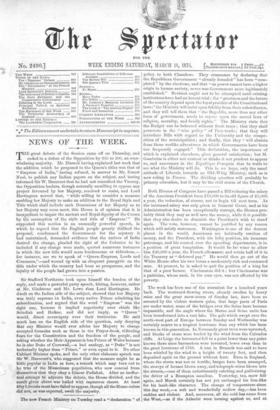Sir Stafford Northcote took upon himself the burden of the
reply, and made a powerful party speech, hitting, however, rather at Mr. Gladstone and Mr. Lowe than Lord Hartington. He dwelt on the Indian side of the subject, showed that her Majesty was truly supreme in India, every native Prince admitting his subordination, and argued that the word "Empress" was the right one, because it implied superiority over chiefs like Scindiah and Holkar, and did not imply, as " Queen " would, direct sovereignty over their territories. He said much less on the English side of the question, only denying that any Minister would ever advise her Majesty to change accepted formulas such as those in the Prayer-book, ridiculing fears for the Constitution and the freedom of the people, and asking whether the Heir-Apparent is less Prince of Wales because he is also Duke of Cornwall,—a bad analogy, as " Duke " is not technically higher than "Prince," or even equal to it. No other Cabinet Minister spoke, and the only other elaborate speech was Sir W. Harcourt's, who suggested that the measure might be as Little popular in India as here, a remark which may turn out to be true of the Mnssulman population, who now conceal from themselves that they obey a Giaonr Padishah. After an ineffec- tual attempt to adjourn the debate, the House divided, and the result given above was hailed with rapturous cheers. At least fifty Liberals must have failed to appear, though all the Home-rulers did not, as was expected, swell the majority.


































